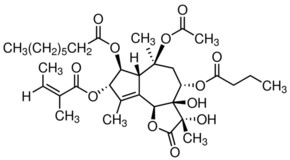Wednesday, 03 February 2021
Researchers from the University of Nottingham have discovered a novel antiviral property of a drug that could have major implications in how future epidemics / pandemics - including Covid-19 - are managed.
The study, published in Viruses*, shows that thapsigargin is a promising broad‑spectrum antiviral, highly effective against Covid-19 virus (SARS-CoV-2), a common cold coronavirus, respiratory syncytial virus (RSV) and the influenza A virus.
Given that acute respiratory virus infections caused by different viruses are clinically indistinguishable on presentation, an effective broad-spectrum that can target different virus types at the same time could significantly improve clinical management. An antiviral of this type could potentially be made available for community use to control active infection and its spread.
The study is a collaborative project led by Professor Kin-Chow Chang and experts at the University of Nottingham (Schools of Veterinary Medicine and Sciences, Biosciences, Pharmacy, Medicine, and Chemistry), and colleagues at the Animal and Plant Health Agency (APHA), China Agricultural University and the Pirbright Institute.
 Thapsigargin is a promising broad‑spectrum antiviral
Thapsigargin is a promising broad‑spectrum antiviral
In this ground-breaking study, the team of experts found that the plant-derived antiviral, at small doses, triggers a highly effective broad-spectrum host-centred antiviral innate immune response against three major types of human respiratory viruses – including Covid-19.
The key features based on cell and animal studies, which make thapsigargin a promising antiviral are that it is:
- effective against viral infection when used before or during active infection
- able to prevent a virus from making new copies of itself in cells for at least 48 hours after a single 30-minute exposure.
- stable in acidic pH, as found in the stomach, and therefore can be taken orally, so could be administered without the need for injections or hospital admission.
- not sensitive to virus resistance.
- at least several hundred-fold more effective than current antiviral options.
- just as effective in blocking combined infection with coronavirus and influenza A virus as in single-virus infection.
- safe as an antiviral (a derivative of thapsigargin has been tested in prostate cancer).
Professor Chang said: "Whilst we are still at the early stages of research into this antiviral and its impact on how viruses such as Covid-19 can be treated, these findings are hugely significant.
The current pandemic highlights the need for effective antivirals to treat active infections, as well as vaccines, to prevent the infection. Given that future pandemics are likely to be of animal origin, where animal to human (zoonotic) and reverse zoonotic (human to animal) spread take place, a new generation of antivirals, such as thapsigargin, could play a key role in the control and treatment of important viral infections in both humans and animals."
Indeed, influenza virus, coronavirus and RSV are global pathogens of humans as well as animals. Thapsigargin represents a lead compound in the development of a new generation of powerful host-centred antivirals (as opposed to conventional antiviral drugs that directly target viruses) that could even be adopted in a holistic "One Health" approach to control human and animal viruses.
Professor Chang adds: “Although more testing is clearly needed, current findings strongly indicate that thapsigargin and its derivatives are promising antiviral treatments against COVID-19 and influenza virus, and have the potential to defend us against the next Disease X pandemic.”
The full study can be found here.
Story credits
* Al-Beltagi, S., C.A. Preda, L.V. Goulding, J. James, J. Pu, P. Skinner, Z. Jiang, B.L. Wang, J. Yang, A.C. Banyard, K.H. Mellits, P. Gershkovich, C.J. Hayes, J. Nguyen-Van-Tam, I.H. Brown, J. Liu, and K.-C. Chang. 2021. Thapsigargin is a broad-spectrum inhibitor of major human respiratory viruses: respiratory syncytial virus, coronavirus and influenza A virus. Viruses. (in press).
Notes to editors:
About the University of Nottingham
Ranked 97 in the world and 17th in the UK by the QS World University Rankings, the University of Nottingham is a founding member of Russell Group of research-intensive universities. Studying at the University of Nottingham is a life-changing experience, and we pride ourselves on unlocking the potential of our students. We have a pioneering spirit, expressed in the vision of our founder Sir Jesse Boot, which has seen us lead the way in establishing campuses in China and Malaysia - part of a globally connected network of education, research and industrial engagement.
Nottingham was crowned Sports University of the Year by The Times and Sunday Times Good University Guide 2024 – the third time it has been given the honour since 2018 – and by the Daily Mail University Guide 2024.
The university is among the best universities in the UK for the strength of our research, positioned seventh for research power in the UK according to REF 2021. The birthplace of discoveries such as MRI and ibuprofen, our innovations transform lives and tackle global problems such as sustainable food supplies, ending modern slavery, developing greener transport, and reducing reliance on fossil fuels.
The university is a major employer and industry partner - locally and globally - and our graduates are the third most targeted by the UK's top employers, according to The Graduate Market in 2024 report by High Fliers Research. Alongside Nottingham Trent University, we lead the Universities for Nottingham initiative, a pioneering collaboration between the city’s two world-class institutions to improve levels of prosperity, opportunity, sustainability, health and wellbeing for residents in the city and region we are proud to call home. More news…